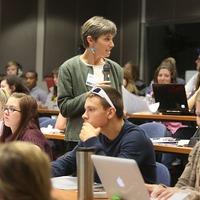Blog:
JA Editor Profile: Back to the field, with new perspective and knowledge

At the Poynter-KSU media ethics conference in 2012, Emily Harris engages students in the conversation. Photographer: Susan Kirkman Zake

In late September 2011, Emily Harris joined the Journalism Accelerator to lead and shape our editorial program. In late 2012, Emily was offered an opportunity to serve as NPR’s Jerusalem correspondent, a challenge she is excited to take on. This post offers Emily’s take on this new opportunity and what new perspectives she’ll bring with her from her time at the JA. The work Emily began here will focus deeper in 2013 on publisher sustainability and peer-to-peer idea exchange to fuel the field, with an announcement in early February of our new lead on editorial to carry forward this critically important work.
Guiding, covering and going deep with publishers, innovators and entrepreneurs exploring new forms of sustainability emerging in the field, Emily has delivered a body of work that lays a foundation for a new kind of living-knowledge base designed around conversation. A knowledge base that synthesizes more than 1,800 comments from practitioners in the field shared on JA, across more than a dozen major forums, scores of direct conversations and on-site facilitation to bring our community practical and proven techniques others have tried, to shorten their path to sustainability. The JA team holds the deepest regard and offers best wishes for Emily as she channels all she has learned from all of you into her work halfway around the world, striving to help make global news relevant to local communities. – Lisa Skube, JA founder and director
When I joined the still-beta Journalism Accelerator in fall 2011, I was as passionate as I’d always been about the purpose of journalism. But, like many of my colleagues across the field, I hadn’t explored the full implications of our industry’s financial upheaval or imagined how I might potentially play a part in shaping its future.
Fifteen months later, I have learned so much. From the beginning, the JA focused on helping journalism find a new, sustainable path, with new audience relationships, new sources of revenue and new ways to think across traditional boundaries. As editorial director, I talked with many people who want journalism to thrive: startup publishers, legacy executives, innovators in advertising, technology developers, funders, business trainers, community leaders, reporters who left the business, journalists who found success even after layoffs, academics and educators, students and people who just like to know what’s going on, especially things they might not have known much about otherwise but that affect them in some way.
I’m leaving the JA now, sad to go but drawn by another terrific opportunity. In a couple of months I head to Jerusalem to serve as NPR’s correspondent covering Israel, the West Bank and Gaza. I’ll take much from the JA with me. Here are three biggies:
- Inspiration. You really don’t have to look that hard to find people dedicated to journalism, but the startup publishers I got to know through JA forums and work to support training provide inspiration by the bucketload. Many created new community or specialized beat news organizations just because they wanted to provide people accurate information and help hold decision-makers accountable. They’ve given time, money, sweat and tears, experimented with different business models and learned skills they perhaps never really wanted to know (like how to manage a sales staff) just to keep their communities informed. I’ll think about them if my going gets rough.
- New ideas about communities and audience connection. JA founder Lisa Skube brought a background in product development, marketing and nonprofit organizing to her vision of a knowledge-sharing network to support journalism. Her deep belief that you build viable businesses by connecting with the community you serve has led me to consider ways I might build a different relationship with radio listeners when I return to reporting. So has exposure to experiments in “engagement” (a word I wish felt a lot less fuzzy) through the likes of WLRN news director Dan Grech (the LeBron James poetry contest, the canoe trip through Miami’s maze of canals by a delivery-truck-driver-turned-radio-contributor, the curation of collective memories of Hurricane Andrew) and The Civic Commons curator of conversation Dan Moulthrop. What might I do from a foreign post that’s similar to what they’ve done locally to get people intrigued, involved and invested in the story?
- Neat tools I want to try. I’ve seen and cited many tools, reports, books, blogs, business models and more as we built the JA collection of resources for journalists to more than 300. I’m going to try Scout to follow legislation pertaining to U.S. policy in the Middle East, 100 Reporters to find sources and stories and Mentionmapp to expand my network. I also love the collection of each week’s best tweets that JA social media maven Nicole Staudinger puts together. There is always something interesting I missed along the way.

Together stronger, Emily Harris (left) and Lisa Skube have broken new ground, building conversations for impact to bring publishers practical tips they can use. Photo by: Nicole Staudinger
I’m grateful I had the chance to help the JA experiment, develop and expand, and I can see journalism just getting better as the industry upheaval shifts and starts to settle. Wherever I am, I hope to keep contributing to that effort however I can.
Check back as the JA announces our new lead on editorial, to post the first week of February! The depth, insight and high standard of reporting Emily has brought to the work of the JA has illuminated nuances in the field of news and information, bringing light to new perspectives that can only be found through those doing the hard work, together more efficiently finding new ways of creating sustainability. What are the lessons you’d like to share with your peers? What new tracks are you dying to explore?









Weigh In: Remember to refresh often to see latest comments!
0 comments so far.